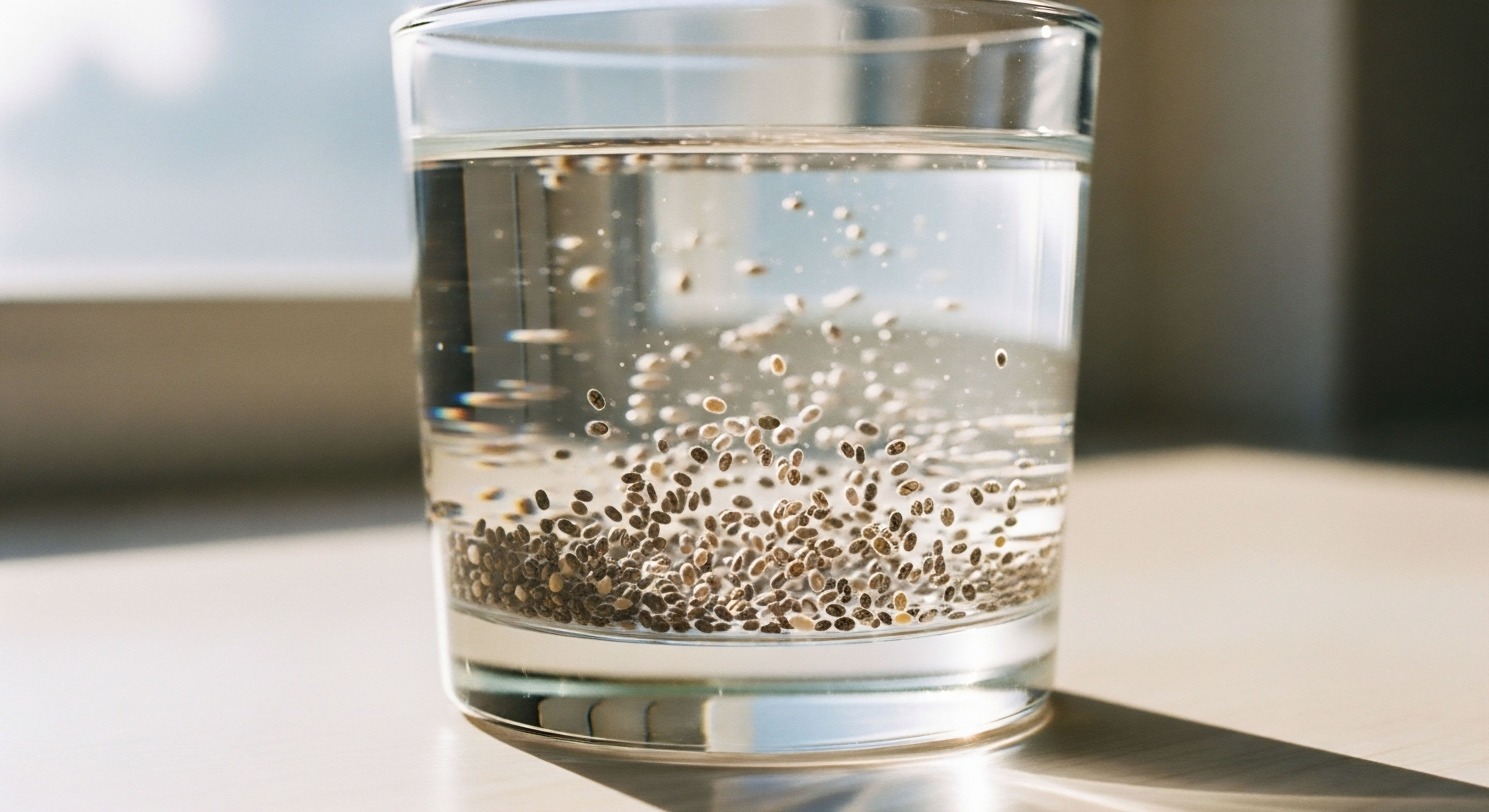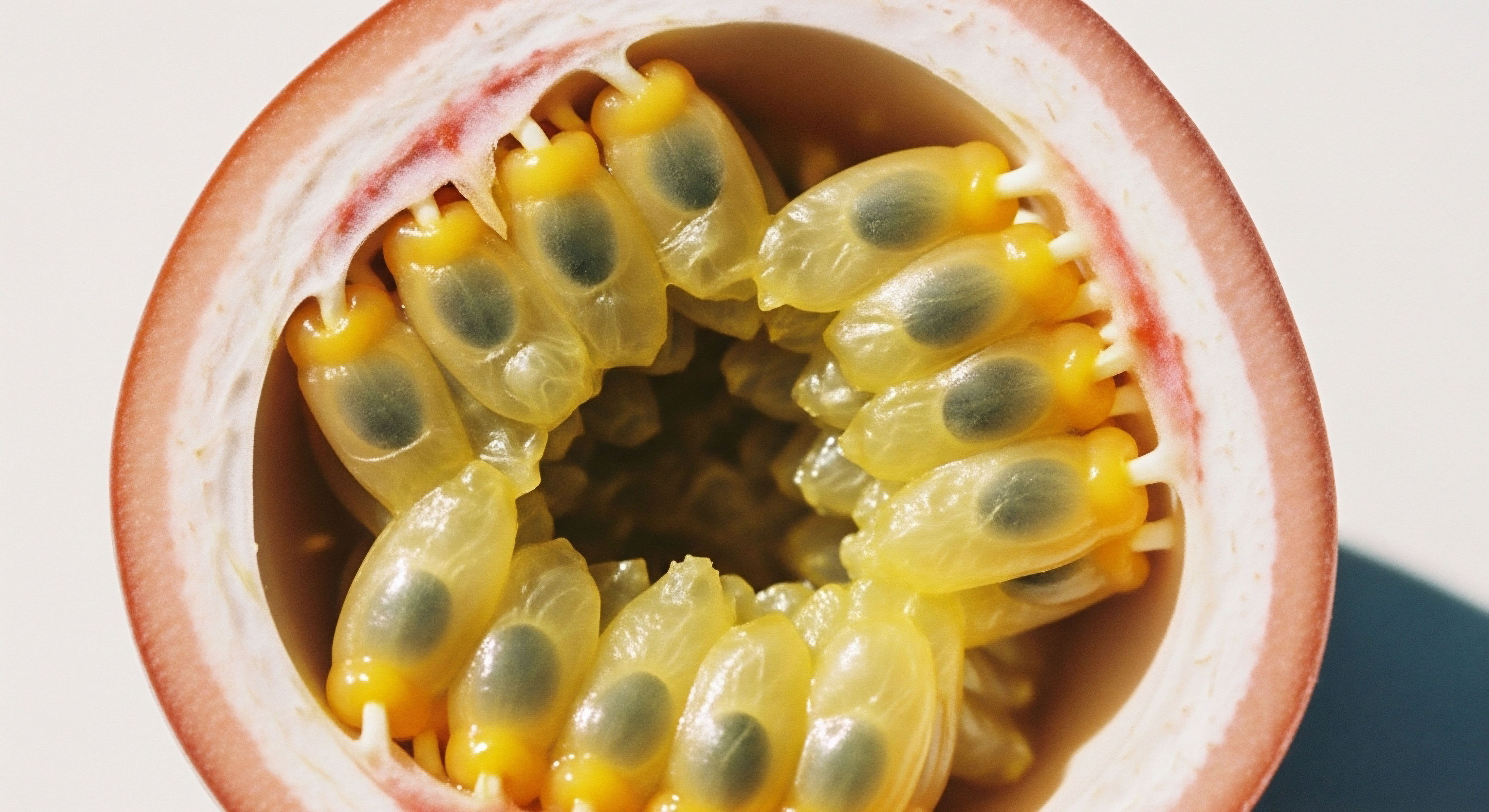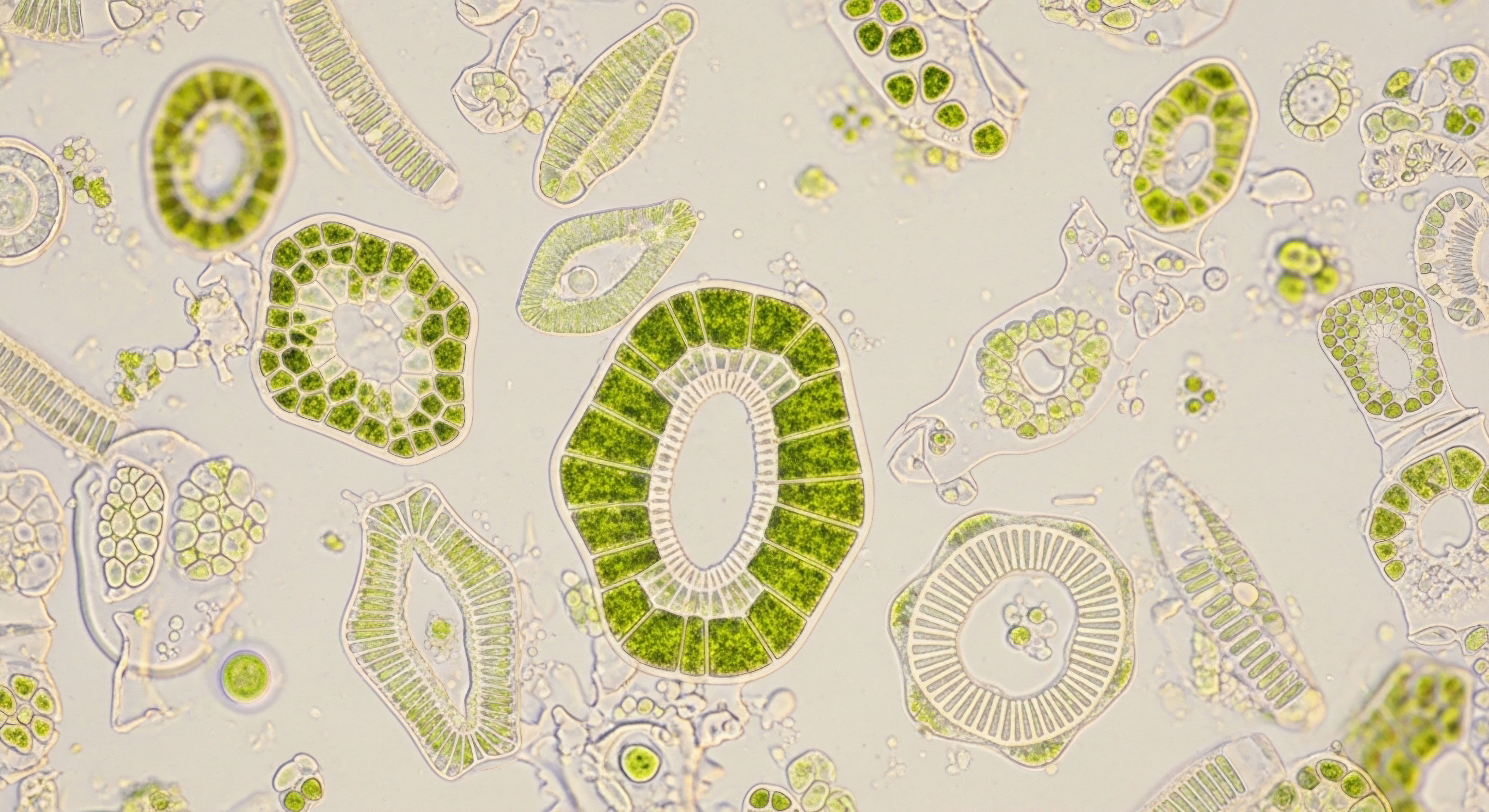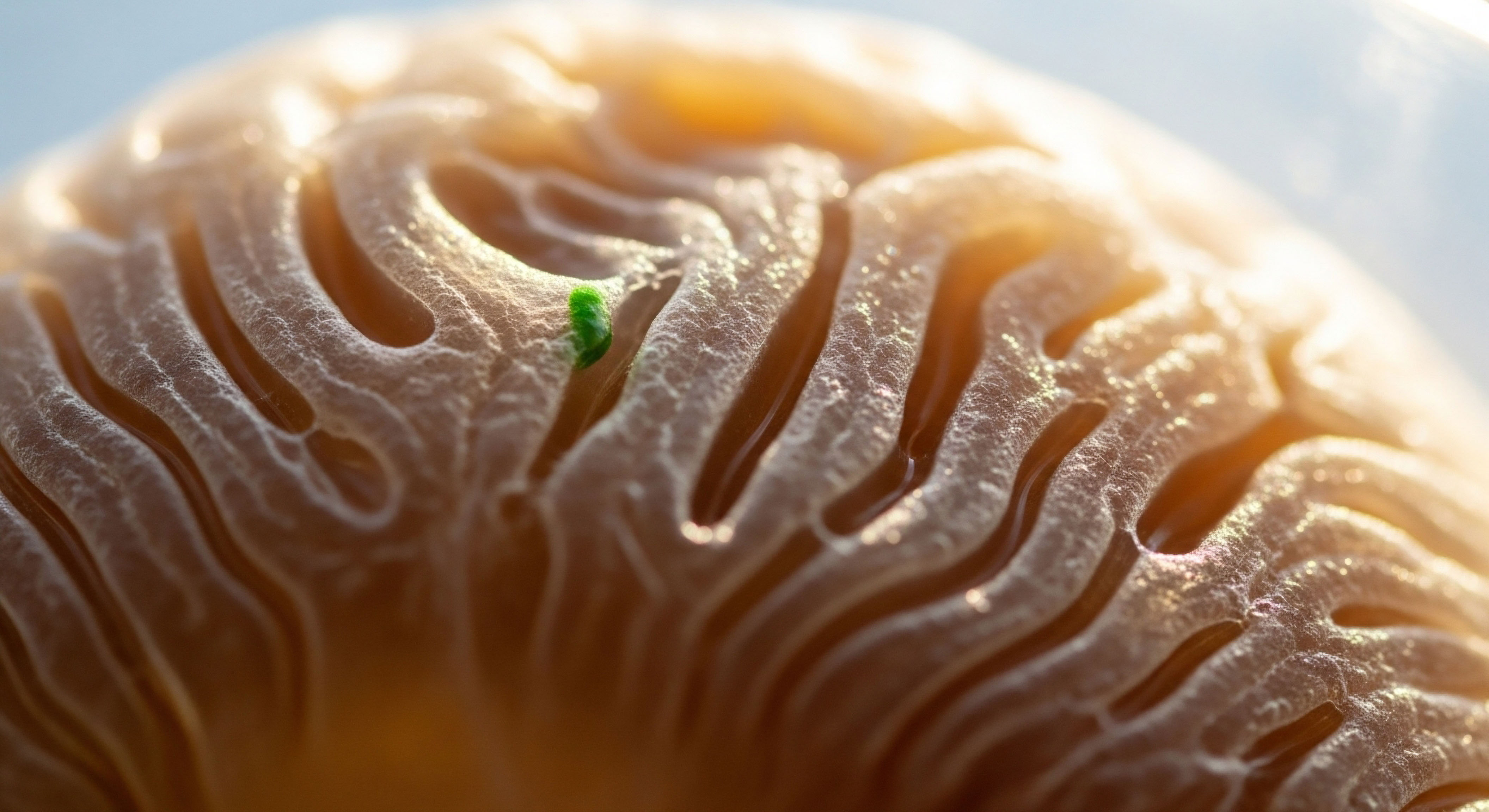

Fundamentals
You feel it long before a diagnosis gives it a name. It is a profound, persistent fatigue that sleep does not touch. It is a mental fog that obscures thoughts and a frustrating shift on the scale that diet and exercise cannot seem to explain.
These experiences are valid, deeply personal, and often the first signals of a thyroid system operating under strain. Your journey to understanding begins with a recognition that these feelings are real biological data points. They are the subjective translation of a complex internal conversation, and a significant part of that dialogue originates in a place you might not expect ∞ your gut.
The connection between your digestive system and your thyroid gland Meaning ∞ The thyroid gland is a vital endocrine organ, positioned anteriorly in the neck, responsible for the production and secretion of thyroid hormones, specifically triiodothyronine (T3) and thyroxine (T4). is an established, powerful biological reality known as the gut-thyroid axis. This is a bidirectional communication highway, where the health of one directly influences the function of the other.
Think of your thyroid as a central metabolic thermostat, setting the pace for energy production in every cell of your body. Your gut, in this analogy, is the sophisticated control center that manages the fuel supply, calibrates the immune response, and even helps fine-tune the hormonal signals the thermostat sends out. When this control center is in disarray, the thermostat cannot function correctly. Addressing your thyroid health, therefore, requires a foundational focus on the ecosystem within your intestines.

The Gut’s Essential Roles in Thyroid Function
The influence of your gut microbiome Meaning ∞ The gut microbiome represents the collective community of microorganisms, including bacteria, archaea, viruses, and fungi, residing within the gastrointestinal tract of a host organism. on your thyroid is not passive; it is active and multifaceted. Several critical processes that determine thyroid vitality are governed by the trillions of microorganisms residing in your digestive tract. Understanding these functions provides a clear rationale for why cultivating a healthy gut environment is a primary strategy in supporting your endocrine system.

Nutrient Availability and Absorption
Your thyroid gland is exceptionally dependent on a steady supply of specific micronutrients to build its hormones and function optimally. These include iodine, selenium, zinc, and iron. Your diet may contain these essential building blocks, yet they must be extracted and made bioavailable for your body to use.
This is a primary job of a healthy gut microbiome. Beneficial bacteria produce enzymes that unlock these minerals from food, transforming them into forms your body can absorb through the intestinal lining. A compromised gut environment, known as dysbiosis, impairs this process, effectively creating a state of nutrient deficiency even when your diet is adequate. This directly starves the thyroid of the raw materials it needs to operate.
A healthy gut microbiome is essential for unlocking and absorbing the key micronutrients your thyroid needs to produce its hormones.

Immune System Calibration
Approximately seventy percent of your body’s immune system Meaning ∞ The immune system represents a sophisticated biological network comprised of specialized cells, tissues, and organs that collectively safeguard the body from external threats such as bacteria, viruses, fungi, and parasites, alongside internal anomalies like cancerous cells. is located in your gut-associated lymphoid tissue (GALT). This makes your digestive tract the primary training ground for your immune cells, teaching them to distinguish between friend and foe. In autoimmune thyroid conditions, such as Hashimoto’s thyroiditis, the immune system mistakenly identifies thyroid tissue as a threat and attacks it.
The health and diversity of your gut microbiome are directly responsible for calibrating this immune response. A balanced microbiome promotes immune tolerance, a state of intelligent self-regulation. An imbalanced one promotes inflammation and can be a significant driver of the autoimmune process itself.

Thyroid Hormone Conversion
Your thyroid produces hormones primarily in an inactive form, thyroxine (T4). To become metabolically active, T4 must be converted into triiodothyronine (T3). While some of this conversion happens in the liver, a substantial portion, up to twenty percent, occurs within the gut.
This critical final step is dependent on an enzyme produced by healthy gut bacteria called intestinal sulfatase. If the population of beneficial microbes is low, this conversion process becomes inefficient. You may have sufficient T4 levels according to a lab test, yet you experience all the symptoms of hypothyroidism because your body cannot make enough of the active T3 hormone. This demonstrates a direct, functional link between your gut flora and your metabolic energy.


Intermediate
Understanding the gut-thyroid axis Meaning ∞ The Gut-Thyroid Axis describes a critical bidirectional communication pathway that connects the gastrointestinal system, specifically the gut microbiome, with the thyroid gland’s function and overall thyroid hormone regulation. provides the foundational “why.” The next step in this journey is to explore the “how” ∞ the specific tools you can use to purposefully modulate this connection. Probiotics, which are live microorganisms that confer a health benefit, represent a targeted intervention to repopulate and rebalance the gut ecosystem.
This is a clinical strategy that moves beyond generic digestive health and into the realm of specific, functional support for your endocrine system. The selection of a probiotic is a precise undertaking, as different strains of bacteria perform distinct jobs within the gut environment.
For thyroid health, the goal is to introduce strains that excel in three key areas ∞ reducing inflammation, strengthening the intestinal barrier, and supporting hormone and nutrient metabolism. We can group these powerful allies into three distinct categories, each with a unique mechanism of action. A comprehensive approach often involves leveraging strains from all three groups to create a robust and resilient gut environment capable of supporting optimal thyroid function.

What Are the Foundational Probiotic Families?
The Lactobacillus and Bifidobacterium genera are the most well-researched and abundant inhabitants of a healthy human gut. They are the cornerstones of a balanced microbiome, performing a vast array of essential tasks. Within these large families, specific strains have been identified for their particular benefits relevant to thyroid health.
These strains work synergistically to lower gut-based inflammation, crowd out pathogenic bacteria, and improve the integrity of the intestinal lining. Their presence sends a signal to the immune system to remain in a state of balanced surveillance, which is vital for individuals with autoimmune thyroid conditions.
| Probiotic Strain | Primary Mechanism of Action | Relevance to Thyroid Health |
|---|---|---|
| Lactobacillus plantarum | Enhances the integrity of the gut barrier and produces antioxidants. | A strong gut barrier prevents inflammatory molecules from entering the bloodstream and triggering an immune response against the thyroid. |
| Bifidobacterium longum | Reduces pro-inflammatory cytokines and aids in the production of short-chain fatty acids (SCFAs). | Lowering systemic inflammation can reduce the autoimmune attack on the thyroid. SCFAs provide energy for gut cells and help regulate T-cell function. |
| Lactobacillus acidophilus | Produces lactic acid, which inhibits the growth of pathogens like H. Pylori and Candida. | Pathogen overgrowth is a known trigger for increased intestinal permeability and systemic inflammation, both of which can exacerbate thyroid issues. |
| Bifidobacterium lactis | Produces antimicrobial peptides and enhances the body’s natural immune defense. | Supports the immune system’s ability to manage pathogens without becoming overactive, promoting a state of tolerance. |
| Lactobacillus rhamnosus | Exceptional at adhering to the intestinal wall, strengthening the gut lining and modulating immune signaling. | Directly supports the physical barrier of the gut and has been shown to promote regulatory immune responses, calming autoimmunity. |

The Specialized Role of Saccharomyces Boulardii
Saccharomyces boulardii is a unique organism in the probiotic world. It is a beneficial, transient yeast, meaning it passes through the digestive system without colonizing it. During its passage, it performs several critical tasks that are particularly beneficial for individuals with compromised gut and thyroid health.
- Pathogen Neutralization ∞ S. boulardii has the ability to bind to and neutralize harmful bacteria and yeast, such as Candida albicans, effectively removing them from the system. This reduces the overall pathogenic load on the gut.
- Immune Stimulation ∞ One of its most important functions is its ability to stimulate the production of secretory immunoglobulin A (sIgA). sIgA is an antibody that acts as the first line of defense in the gut, lining the mucosal surfaces and preventing pathogens from adhering to the intestinal wall.
- Cellular Repair ∞ This beneficial yeast also secretes compounds that promote the health and repair of enterocytes, the cells that make up the intestinal lining. This directly contributes to healing intestinal permeability.

What Are Spore-Based Probiotics?
Spore-based probiotics, often from the Bacillus genus, represent a third, highly resilient category of gut support. These organisms are found naturally in the soil and are defined by their ability to form a hard, protective endospore. This spore allows them to survive the harsh acidic environment of the stomach and arrive in the intestines intact, where they can revert to their active, growing form.
Spore-based probiotics are uniquely resilient, surviving stomach acid to effectively recondition the gut environment and increase microbial diversity.
Their primary function is to act as gut reconditioners. They are known to increase microbial diversity by promoting the growth of other beneficial species, including Lactobacillus and Bifidobacterium. Strains like Bacillus coagulans and Bacillus subtilis have been shown to actively target and reduce populations of problematic bacteria while improving the overall health of the gut ecosystem.
This makes them a powerful tool for shifting a dysbiotic gut back toward a state of balance, which is a foundational requirement for supporting thyroid health.


Academic
A sophisticated examination of probiotic intervention for thyroid health Meaning ∞ Thyroid health refers to the optimal physiological function of the thyroid gland, a butterfly-shaped endocrine organ located in the neck, which is crucial for producing and secreting thyroid hormones. requires moving beyond general gut balance and into the precise molecular mechanisms that connect microbial activity to thyroid autoimmunity. The pathogenesis of Hashimoto’s thyroiditis, the leading cause of hypothyroidism in the developed world, is rooted in a loss of immunological self-tolerance.
Specific probiotic strains Meaning ∞ Probiotic strains are specific live microorganisms that, when adequately administered, confer a health benefit to the host. can directly intervene in this process by modulating the intricate dialogue between the gut microbiome and the systemic immune system. The primary therapeutic target is the inflammatory cascade driven by intestinal permeability Meaning ∞ Intestinal permeability refers to the regulated barrier function of the gastrointestinal lining, specifically the intestinal epithelium, which meticulously controls the passage of substances from the gut lumen into the bloodstream. and an imbalanced T-cell response.

Modulating T-Cell Differentiation to Restore Immune Tolerance
The autoimmune attack in Hashimoto’s is characterized by an imbalance between pro-inflammatory T-helper 17 (Th17) cells and anti-inflammatory T-regulatory (Treg) cells. Th17 cells produce cytokines like IL-17 that drive tissue destruction, while Treg cells produce anti-inflammatory cytokines like IL-10 and TGF-beta that suppress autoimmune reactions. A healthy gut microbiome is instrumental in maintaining a favorable Treg/Th17 balance.
Specific probiotic strains, particularly from the Bifidobacterium and Lactobacillus genera, have been shown to directly influence this balance. For instance, Bifidobacterium longum can promote the differentiation of naive T-cells into Treg cells by interacting with dendritic cells in the gut’s Peyer’s patches.
These dendritic cells then present microbial antigens in a way that signals for tolerance instead of attack. By increasing the population of Treg cells, these probiotics can help systematically quell the autoimmune response directed at the thyroid gland.

The Role of Lipopolysaccharide in Triggering Autoimmunity
Increased intestinal permeability, a condition where the tight junctions between intestinal cells loosen, is a key factor in the development of autoimmune diseases. This allows translocation of bacterial components, most notably lipopolysaccharide (LPS), from the gut lumen into systemic circulation. LPS is a potent endotoxin from the cell walls of gram-negative bacteria that triggers a strong inflammatory response via Toll-like receptor 4 (TLR4) on immune cells.
This LPS-induced inflammation can exacerbate thyroid autoimmunity in two ways. First, it promotes a systemic inflammatory state that lowers the threshold for an autoimmune reaction. Second, a phenomenon known as molecular mimicry can occur, where the immune system’s response to LPS cross-reacts with structurally similar proteins in the thyroid gland.
Probiotic strains like Lactobacillus plantarum and the beneficial yeast Saccharomyces boulardii are clinically effective at strengthening the intestinal barrier. They upregulate the expression of tight junction proteins like occludin and zonulin-1, effectively sealing the gut lining and reducing the amount of LPS that enters the bloodstream. This intervention directly reduces a primary trigger of the autoimmune cascade.
Targeted probiotics can reduce the autoimmune attack on the thyroid by strengthening the gut barrier and preventing inflammatory bacterial components from entering circulation.

How Does the Microbiome Influence Thyroid Hormone Metabolism?
The gut microbiome’s influence extends to the direct metabolism and bioavailability of thyroid hormones Meaning ∞ Thyroid hormones, primarily thyroxine (T4) and triiodothyronine (T3), are crucial chemical messengers produced by the thyroid gland. and the essential co-factors required for their synthesis. This represents a critical, non-immunological pathway through which probiotics can support thyroid function.
- Enterohepatic Circulation ∞ Thyroid hormones undergo conjugation in the liver, are excreted into the gut via bile, and are then reactivated and reabsorbed. This process of enterohepatic circulation is dependent on the bacterial enzyme β-glucuronidase. An imbalanced microbiome can have either too much or too little of this enzyme activity, disrupting hormone recirculation and leading to a net loss of active thyroid hormone.
- Micronutrient Bioavailability ∞ The synthesis and conversion of thyroid hormones are entirely dependent on specific micronutrients. The gut microbiome plays a vital role in the absorption and metabolism of these key elements. A dysbiotic gut impairs this process, creating functional deficiencies that directly impact thyroid physiology.
| Nutrient | Role in Thyroid Physiology | Microbiome-Mediated Action |
|---|---|---|
| Selenium | Essential co-factor for the deiodinase enzymes that convert inactive T4 to active T3. It also has antioxidant properties that protect the thyroid gland. | Certain probiotic species can enhance the absorption and conversion of dietary selenium into its usable forms, selenoproteins. |
| Zinc | Required for the synthesis of TSH in the pituitary gland and also plays a role in the conversion of T4 to T3. | A healthy gut microbiome with adequate populations of Lactobacillus and Bifidobacterium is associated with improved zinc absorption. |
| Iron | The enzyme thyroid peroxidase, which is responsible for synthesizing thyroid hormones, is iron-dependent. Iron deficiency can impair hormone production. | Gut dysbiosis and inflammation can reduce iron absorption. Probiotics that reduce inflammation can improve iron status. |
| Iodine | The fundamental building block of thyroid hormones (T4 and T3). | The microbiome influences iodine uptake by the thyroid gland. Dysbiosis has been linked to reduced absorption of this critical mineral. |

References
- Shu, Qinxi, et al. “Effect of probiotics or prebiotics on thyroid function ∞ A meta-analysis of eight randomized controlled trials.” PLOS ONE, vol. 19, no. 1, 2024, p. e0296733.
- Knezevic, J. et al. “Thyroid-Gut-Axis ∞ How Does the Microbiota Influence Thyroid Function?” Nutrients, vol. 12, no. 6, 2020, p. 1769.
- Pais, P. et al. “Pathophysiology of ‘leaky gut’ and its role in the pathogenesis of autoimmune disease.” Autoimmunity Reviews, vol. 19, no. 11, 2020, p. 102665.
- Virili, C. & Centanni, M. “Does microbiota composition affect thyroid homeostasis?” Endocrine, vol. 49, no. 3, 2015, pp. 583-587.
- Tompkins, T. A. et al. “A comprehensive review of the benefits of S. boulardii on gut health and disease.” Canadian Journal of Gastroenterology, vol. 20, no. 4, 2006, pp. 257-264.
- Feng, T. et al. “Lactobacillus rhamnosus GG supernatant promotes intestinal barrier function and tight junction protein expression in a Caco-2 cell model.” Journal of Dairy Science, vol. 101, no. 10, 2018, pp. 8749-8757.
- Goh, Y. J. & Klaenhammer, T. R. “Genetic mechanisms of probiotic adaptations.” Annual Review of Food Science and Technology, vol. 6, 2015, pp. 199-221.

Reflection
The information presented here offers a map, detailing the intricate biological pathways that connect your digestive health to the function of your thyroid. It provides a clinical framework for understanding how targeted interventions, like specific probiotic strains, can become powerful tools in your wellness protocol. This knowledge is the first, essential step. It transforms the abstract feelings of fatigue or mental fog into something tangible ∞ a biological process that can be understood and supported.
Your personal health story is unique. The way your body responds to these interventions will be shaped by your individual genetics, lifestyle, and history. Consider this article a resource to facilitate a more informed, collaborative conversation with your healthcare provider.
The ultimate goal is to move from a place of reacting to symptoms to a position of proactively cultivating resilience within your body’s interconnected systems. This journey is about reclaiming a sense of agency over your own biological function, armed with a deeper understanding of the body you inhabit.















